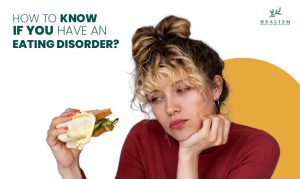
An eating disorder is when you have an unhealthy relationship with food.
It can cause:
- Over eating.
- Eating too little.
- Becoming obsessed with your body shape and weight.
Some treatments are there that can assist you in managing your weight healthily and guide you about a balanced diet.
Both men and women of any age can have an eating disorder. It usually develops in the teenage years and continues for years if you don’t control or manage it.
What Is an Eating Disorder?
An eating disorder is a mental health condition.
It causes abnormal and unhealthy eating habits.
Eating disorders are about more than a person’s relationship with food. These mental health concerns can affect your relationships, your professional success, and your aims in life.
Similarly, when it is left untreated, it can cause serious risks.
Approximately 28.8 million US people, or 9% of the population, will have an eating disorder in their lifetime — ANAD reports these statistics.
Eating disorders can affect both physical and mental health. It majorly influences your behaviors around food and body shape.
For further support and to get more information, you may reach out to Healizm — feel free to ask any questions you might have.
Types of Eating Disorders
There are various types of eating disorders; each carries its unique symptoms.
Common types of eating disorders include:
- Anorexia nervosa is a condition that is marked by restricting food intake.
- Bulimia nervosa includes binge eating and purging or non-purging.
- Binge eating disorder involves eating food in excessive amounts and being unable to stop eating.
- Avoidant restrictive food intake disorder (ARFID) is a state that includes limiting the amount and sort of food you eat.
- Pica involves eating stuff not considered in food, such as paint, glass, and non-essential things.
- Rumination disorder is a state marked by rechewing, accepting, or vomiting out your food.
Common Signs That Indicate That You Have an Eating Disorder

Here are some symptoms that might show you have an eating disorder:
-
Difficulty Eating in Front of Others
Some people with eating disorders constantly want to eat “normally” in front of others, but they fail to do so.
They may avoid social events where food is involved. They don’t attend the family meals and make excuses about just having eaten. If they do eat in front of others, there may be an indication of definite norms.
Many people may eat their meals in front of others. They might present as if everything is fine.
Nevertheless, when they are alone, there are signs of disordered patterns.
-
Strict Rules Around Eating
Many people with eating disorders develop unbending practices and rules around eating. For example, some people might eat once a day.
They may only eat from a demanding list of safe foods.
They might also follow severe caloric or macronutrient counts.
Conflicting from these rules often coincides with colossal anxiety and uneasiness.
-
Guilt or Shame While Eating
People with eating disorders often observe sharp shame or guilt about food and eating.
They may feel bad about eating a particular food.
These intense feelings can continue in more disordered ways and erode the person’s self-esteem.
Some people also practice blame and shame around the eating disorder itself.
They may be self-conscious of their signs, causing them to conceal their struggles from others.
The fear of “getting caught” can be scary, which can clarify why some people eat privately or misrepresent their behaviors to others.
-
Compensatory Behaviors for Eating
Many people with eating disorders are involved in compensatory behaviors to bring weight loss or offset the effects of eating.
Compensatory behaviors can occur on an extensive range, but they may contain self-induced vomiting, abusing laxatives, fasting, or limiting foods.
There is often essential time and exertion spent appealing to these numerous behaviors.
-
Body Dysmorphia
Not everybody with body dysmorphia has an eating disorder – althought there can be a connection between both.
It’s assessed that over 32% of people with body dysmorphic disorder have an eating disorder.
People with eating disorders may have repetitive behaviors, compulsive thoughts, and other mental behaviors concerning their apparent external flaws.
-
Preoccupation with Weight Loss
Many individuals with eating disorders feel fanatical about losing weight.
This wish can be the catalyst that first puts people on a diet and spirals into an eating disorder.
The worry can result in people weighing themselves numerous times daily and fixating on scale fluctuations.
It is supposed that there isn’t a number that feels “little” enough.
Conclusion
Eating disorders can be overwhelming to the mind, spirit, and body.
Individuals with eating disorders naturally struggle with strong emotional patterns, anxiety, sadness, and physical appearance.
It is equally important for you or your loved one to receive treatment by expert therapists, physicians, and dieticians.
Once an eating disorder has been documented, it can be treated and recovered from.
If you think someone you know is struggling with an eating disorder, you can help them by contacting Nahil Psychiatry Services PLLC.
FAQs
Can you self-diagnose the eating disorder?
Self-diagnosis isn’t recommended.
These disorders need professional evaluation to be accurately diagnosed and treated.
What is pica eating disorder?
Pica is an eating disorder in which an individual eats items that is not considered food.
It can be soil, chalk, grass, toys, hair, soap, cloth and etc.
It can affect people of any age.
How do you overcome an eating disorder?
There are a few steps that you can take to overcome the eating disorder. These include:
- Seek help.
- Psychotherapy (CBT).
- Nutritional counseling.
- Support groups.
What is the treatment for eating disorders?
Treatment plans for eating disorders contain:
- Psychotherapy.
- Monitoring.
- Medical care.
- Nutritional counseling.
- Combination of these methods.
